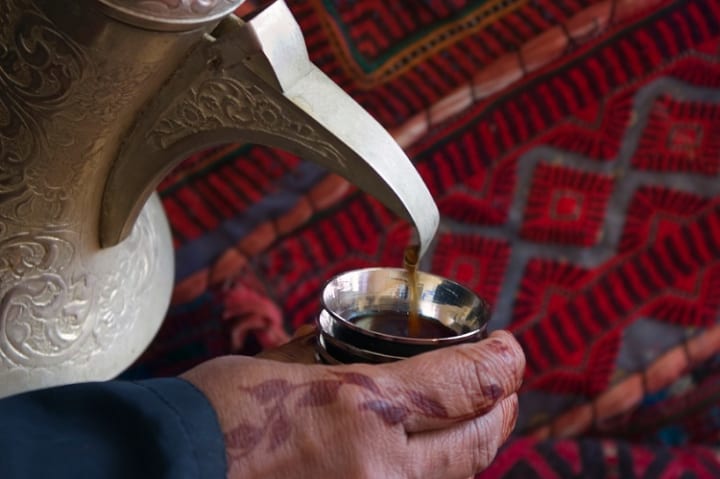How To Be Polite In the Middle East
When trying to blend in with the locals and make the most of a trip, learning how to be polite in the Middle East can make a big difference.

When you're traveling abroad, it's absolutely vital to realize that you're representing your home country to the rest of the world. Whenever you're outside of your home country, you are a guest in someone else's nation. How you treat others will often be the basis by which people determine how they view your country.
In most cases, learning local etiquette can make a huge difference in how people treat you. If you're visiting the Middle East, learning local manners is absolutely crucial to enjoying your stay — and can even make the difference between life and death in some cases.
Before you get on a plane to Dubai, make sure that you know how to be polite in the Middle East.
Part of learning how to be polite in the Middle East is understanding the calendar's effect on manners.

When traveling abroad, it's crucial to learn about Islamic holidays and weekends. This can help you adequately plan your trip and avoid major faux pas.
In Islam, Friday is the major holy day of the week — and as such, most weekends in the Middle East will start on Friday and end on Saturday instead of the usual Saturday and Sunday span in Western countries.
Islam is a religion that goes by the lunar calendar, which means that holidays and festivals don't always show up at the same time of the Gregorian year. Here are some points you need to watch out for as a Westerner:
- Before you travel to the Middle East, make sure to time your trip around the two major festivals. Eid al-Fitr and Eid al-Adha are the two largest festivals in the Islamic religion, and they both last a minimum of three days. During this time, most businesses will be closed and travel will be limited.
- Eating, smoking, or drinking during the day in the month Ramadan is considered exceptionally rude. This is crucial to learn, since there have been occasions where tourists have gotten into trouble for breaking the rules of Ramadan — even when they are not practicing Muslims. If you need to eat or drink something, only do it indoors where people cannot see you. This shows respect, and also shows that you know how to be polite in the Middle East.
It's also worth noting that some Middle Eastern countries may also enforce mandatory breaks throughout the day as a way to ensure that everyone prays at the proper times. While you might not be required to pray alongside them, it's important to show respect and patience while locals conduct their religious rites.
Learn the greetings and common sayings.

While it's always wise to try to learn a little bit of the local language, the truth is that there aren't many regions of the Earth that take their language as seriously as the Middle East.
Most Arabic countries are very proud of their language, so speaking it is a sign of good manners and respect from the West. Therefore, it's important to include a couple of phrases in any guide on how to be polite in the Middle East.
Here are some Arabic phrases you should know by heart before you arrive:
- "As-salaam- Alaikum," is a way to politely greet people. It means, "Peace be with you." The proper reply to this is, "Wa-Alaikum-Salaam," which translates into "May peace be with you, too."
- "Marhaba," is a casual way to say hello. It can be used with almost anyone.
- "Keif al-Hal?" is how you ask someone how they are. The proper traditional reply is "Al-hamdulillah," which translates into, "Praise be to Allah."
- "Min fadlak," (to a male) and "min fadlik" (to a woman) are how you say "please." Saying thanks is done by saying, "Shukran."
- "Ma'a salama," is the polite way to say goodbye. It literally means, "Go in peace."
These small phrases may seem like very little to us, but they may mean the world to locals.
Much of learning how to be polite in the Middle East may be counterintuitive for Westerners — especially in the business world.

In the Middle East, the concept of wasta often makes a huge impact on how well business meetings go. Wasta is the idea of, "It's not what you know, but who you know," mixed in with the understanding that you look out for one another via favors. Not having an "in" with wasta may mean more paperwork, higher rates, and more.
In the United States and elsewhere, the idea of doing favors "because you know someone" is often considered underhanded and sketchy. However, in the Middle East, wasta is just seen as a fact of life — or even, to a point, an honor system.
If you notice that they are asking for a favor for a friend as part of a business meeting, this is wasta. Tradition and business acumen dictates that you do not refuse a wasta favor outright regardless of what it is. Do it to your best ability, or at least, make it seem like you tried to do it.
Wasta alone isn't the only thing that might trip up business people who are traveling to the Middle East. Here are some other major points people going to the Middle East on business should be aware of:
- A large part of learning how to be polite in the Middle East is learning how to disagree without coming off as rude. Outright refusal or disagreement is considered rude, aggressive, and arrogant. It can get you in major trouble or even cause a scene in certain regions. A better way to deal with disagreement would be to say, "I think we could move forward better by..." or, "Perhaps we could rather try..."
- If you need to be candid, use email or phone calls. Doing it face-to-face may make you lose face.
- Time tends to go by in a more relaxed manner in the Middle East, and that means that you may end up with people who are late to meetings. It's not unusual for people to be as much as half an hour late or more when meeting up with you in many parts of the Middle East. That being said, it's best to be patient. The lateness is not done out of disrespect; it's just the way things are.
- Business meetings are often more relaxed, and a little more personal. The Middle East has a tradition of doing small talk before and after business meetings. This is the way people get to know you and improve their relationships with you. Interruptions are frequent, negotiations can be slower-paced, and there may not be an actual schedule for the meeting. If you notice this, don't be shocked. Business meetings are circular in nature, and making a connection is often far more important than discussing all the topics at hand.
Of course, part of learning how to be polite in the Middle East also deals with dress code.

Much like in many other parts of the world, appearance matters greatly in the Middle East. The vast majority of Middle Eastern countries have a deep focus on conservative clothing made of high quality — and you would be wise to follow suit.
Women in particular need to be careful about what they wear. Depending on which country you visit, you can be arrested for public indecency. The following guidelines will help you learn how to dress properly for most Middle Eastern areas:
- Westerners should not try to wear the traditional dress but should make a point to follow local laws involving dress codes. Many areas in the Middle East will take it as an offense if they see Westerners wearing abayas or keffiyehs. However, that doesn't mean you can skirt local laws. Most parts of the Middle East will have laws involving what must be covered up.
- Women would be wise to cover their elbows, arms, legs, and chest at all time. Most parts of the Middle East have modesty as the name of the game.
- Shoes are to be kept on at all times unless you're entering a living room or getting ready to sit down for dinner on a rug. Showing the soles of your feet to others is considered to be very rude in most of the Middle East. Touching people with your feet or shoes is also rude, as is sitting with your feet up.
Dining manners also are going to take some getting used to, as well.

Much of learning how to be polite in the Middle East also deals with table manners and hospitality. Most countries in this region deeply pride themselves on hospitality, and not being able to provide adequate surroundings for guests is considered to be a great shame. As a result, if you end up being a guest in a Middle Eastern household, you should expect a lot of treats.
That being said, guests, too, are expected to be very polite when receiving acts of hospitality. Being rude will alienate you from hosts and also make your trip more difficult in most cases. When visiting or dining with friends in a Middle Eastern country, you should be aware of the following rules...
- In many Arabic countries, sitting on cushions on the floor is the norm. You're allowed to readjust yourself as need be, but don't act surprised if you see this as a standard act.
- Always follow the host's instructions. Do not seat yourself! Let your host tell you where to sit and when it's time to serve yourself.
- Eat what is offered to you. As a guest, you are most likely going to be given the tastiest food in the house. It's considered to be good manners to accept.
- Respect your elders. The oldest people in any family are the ones who are the most respected. They get preference over everyone else and are often the first to be greeted and the first to sit. In certain regions, it's common to stand as a sign of respect whenever your elder walks into the room.
- In many parts of the Middle East, it's customary to have food served in communal bowls and to serve yourself. Cutlery may or may not be included in serving, so make sure that you wash your hands prior to eating. If no cutlery is presented to you, using bread to scoop up food is the best way to handle things.
- Very conservative countries will often have men and women dining in separate areas. This is also true in public arenas. Women and families will often be served in "family sections" of restaurants, while all-male groups will be served in the "men's section."
- Bringing a small gift to a host is customary, but don't bring alcohol. Most Arabic countries will see a gift of alcohol as a very rude gesture. A better option would be sweets or flowers.
- Only eat with your right hand, and only shake hands with your right hand. You'll find this tip in every guide discussing how to be polite in the Middle East. The reason why you should never eat or shake hands with your right hand is because the left hand is traditionally used for unclean activities, such as wiping one's rear end. Eating with your left hand, therefore, is seen as potentially contaminating the food in many parts of the Middle East.
- While you can compliment the food and house freely, complementing individual objects is not advised. Tradition states that hosts must give away whatever the guest compliments too heavily, as long as it's not the house itself.
- Do not bring up religion or politics, period. This is the easiest way to get locals to take offense to you — or end up in serious trouble.
Being a good guest shows that you know how to be polite in the Middle East, but it's important to understand the full scope of the concept of hospitality in Arabic culture. If you invite someone who hosted you out, you are expected to show the utmost respect and generosity as well.
How to be polite in the Middle East will also vary from country to country.

This may seem obvious, but it's very much worth stating that every Middle Eastern country is different — albeit, in often subtle ways. Since there are mild differences, it's important to know some of the bigger ones that can help you blend in just a tad bit better.
- In Jordan, if you are offered food or refreshments during a business meeting, you're expected to refuse twice. On the third time, you are generally expected to eat.
- The "thumbs up" gesture is considered very rude in Iran and surrounding areas. It's basically the Arabic version of giving someone the middle finger.
- Most conservative countries do not allow public displays of affection. Handholding is considered to be platonic in much of the Middle East. Kissing, hugging, or anything else is generally considered to be forbidden in the more conservative nations in this region.
- In Saudi Arabia and other conservative countries, it's a bad idea for women to travel without a male relative. At best, it's considered rude and risky. At worst, it could be against local laws — and that can lead to serious problems.
- Never clean the food off your plate in Egypt, or add salt to the food that an Egyptian offers you. These are both subtle insults that say that the host didn't feed you enough or that the food doesn't taste good.
- Always accept offerings of mint tea when in Morocco. Mint tea is the national symbol of hospitality for Moroccans. Refusing it is a sign of disapproval.
At the end of the day, learning how to be polite in the Middle East isn't that hard.
For the most part, it's all about respecting the religion, the family units, and the region's love of hospitality. Once you understand that, much of it falls into place fairly easily.
About the Creator
Cato Conroy
Cato Conroy is a Manhattan-based writer who yearns for a better world. He loves to write about politics, news reports, and interesting innovations that will impact the way we live.






Comments
There are no comments for this story
Be the first to respond and start the conversation.